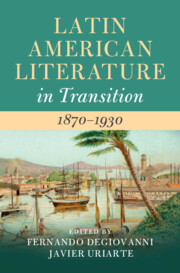Book contents
- Latin American Literature in Transition 1870–1930
- Latin American Literature in Transition
- Latin American Literature in Transition 1870–1930
- Copyright page
- Contents
- Figures
- Contributors
- Acknowledgments
- Introduction
- Part I Commodities
- Part II Networks
- Part III Uprisings
- Chapter 12 Anarchisms
- Chapter 13 Indigenismos
- Chapter 14 Abolitionism
- Chapter 15 Rural Insurgencies
- Part IV Connectors
- Part V Cities
- Index
- References
Chapter 15 - Rural Insurgencies
from Part III - Uprisings
Published online by Cambridge University Press: 14 January 2023
- Latin American Literature in Transition 1870–1930
- Latin American Literature in Transition
- Latin American Literature in Transition 1870–1930
- Copyright page
- Contents
- Figures
- Contributors
- Acknowledgments
- Introduction
- Part I Commodities
- Part II Networks
- Part III Uprisings
- Chapter 12 Anarchisms
- Chapter 13 Indigenismos
- Chapter 14 Abolitionism
- Chapter 15 Rural Insurgencies
- Part IV Connectors
- Part V Cities
- Index
- References
Summary
The chapter examines how diverse forms of rural insurgency (i.e. banditry, caudillismo, millenarianism, revolutionary uprisings) were depicted in literature from the tapering off of the civil wars to the Mexican Revolution. Rural insurgency was a paramount preoccupation for letrados of the period, not only because of the material challenges that it posed to the imposition of agrarian capitalism and the sovereignty of the nation-state, but also because rural insurgency tapped into the cultural capital of rural societies (e.g. kinship, networks of patronage), forms of leadership (e.g. caudillismo), heterodox versions of Catholicism to articulate dreams of social justice (e.g. millenarianism). Hence, rural insurgency was considered, by its mere existence, an existential challenge to the very notion of a modern capitalist nation-state. However, the chapter examines how, at the same time that literature served as a sort of “prose of counterinsurgency” (Ranajit Guha), it was also a site of reflection on the dilemmas attending the constitution of a modern polity and culture.
Keywords
- Type
- Chapter
- Information
- Latin American Literature in Transition 1870–1930 , pp. 222 - 236Publisher: Cambridge University PressPrint publication year: 2022



